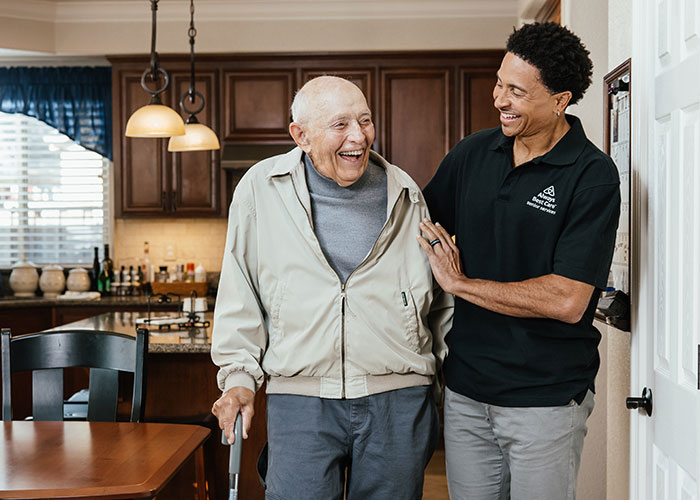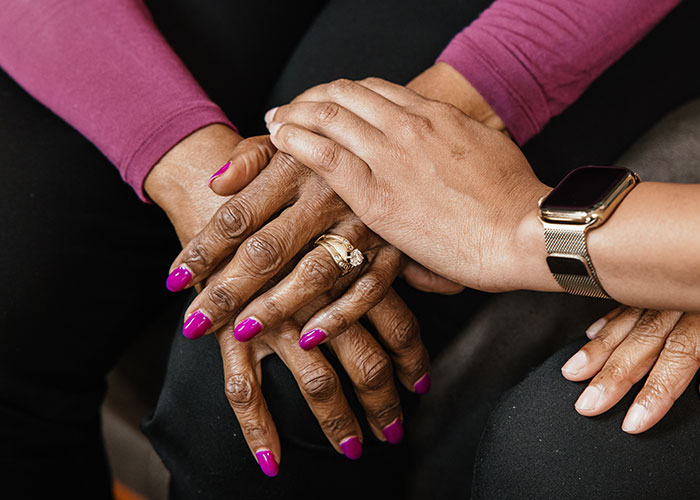Is Pneumonia Contagious? Stages, Symptoms & FAQs
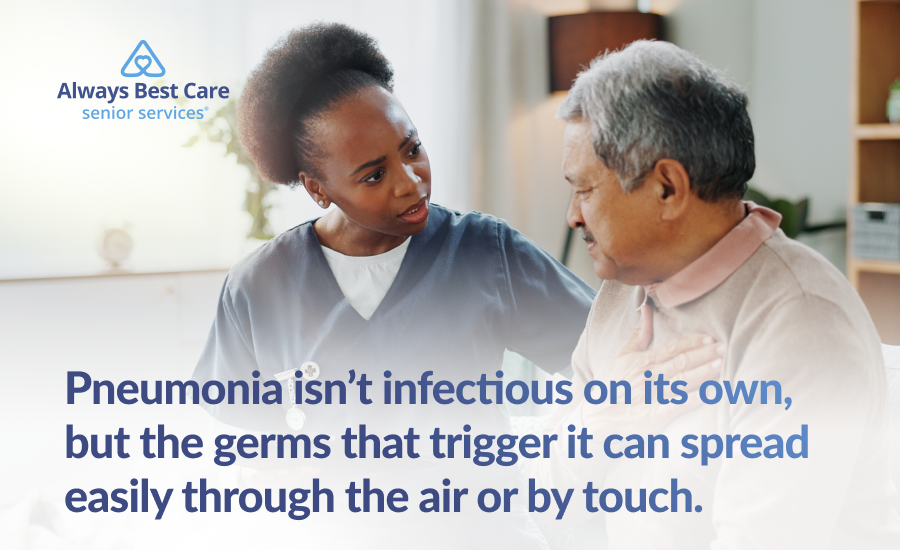
Table of Contents
Is Pneumonia Contagious? Key Takeaways
- You can’t catch pneumonia from someone, but you can catch the bacteria or viruses that lead to it
- Pneumonia progresses through four stages, including congestion, red hepatization, grey hepatization, and resolution
- Unlike more serious cases, walking pneumonia is mild and usually manageable at home.
Did you know that more than 900,000 Americans contract pneumonia each year?
Unfortunately, elderly individuals are four times more likely to get this illness than younger people and face higher hospitalization rates as well.
While pneumonia can be a life-threatening condition, many cases are mild.
In this guide, we will:
- Answer the question, “Is pneumonia contagious?”
- Explore the different stages of pneumonia
- Cover the symptoms for each stage
- Share how you can manage your loved one’s condition
- Explain how our services at Always Best Care can help your loved one during their recovery
Is Pneumonia Contagious?
Pneumonia itself isn’t contagious, but the viruses and bacteria that cause it are.
These germs can spread through the air when someone coughs or sneezes, or by touching contaminated surfaces, making pneumonia easy to catch from someone who’s infected.
4 Stages of Pneumonia and Their Symptoms
Pneumonia goes through four stages. Each stage has a name that describes what’s happening with the infection as it progresses.
The four stages of pneumonia include:
Stage 1: Congestion
The first stage of pneumonia is called “congestion.” In this stage, lungs start to fill up, causing symptoms like a wet cough, chest pain, and fever.
This usually occurs within the first 24 hours after the infection kicks in.
The good news? Detecting pneumonia in its early stages can help minimize the chances of any serious complications.
In the congestion stage, you may notice a few symptoms like:
- A high fever with chills
- Coughing that can bring up clear, yellow, or green sputum
- Loss of appetite
- Pressure or heaviness in the chest
- Shortness of breath
- Hypoxia (in some cases), also known as low oxygen levels in the body
Stage 2: Red Hepatization
Pneumonia symptoms might get worse after the first 24 hours, as red blood cells and other immune cells rush to the lungs and alveoli to fight the infection.
This marks the onset of the second stage of pneumonia, known as red hepatization.
During red hepatization, red blood cells fill up the lungs, turning them a flushed red color, rather than their normal pinkish gray.
This change, along with reduced oxygen levels, makes the lungs dry and firm, similar to a liver. This is where the term “hepatization” comes from, which refers to the liver-like appearance of the lungs.
In the red hepatization phase, symptoms often get more intense, and you may experience:
- Severe shortness of breath
- Extreme fatigue
- Coughing up thick, yellow-green, and sometimes blood-stained phlegm
- High fever, chills, and violent shivering known as rigors
- Delirium in elderly individuals
- Cyanosis – a condition in which your skin or lips turn a bluish color due to lack of oxygen
Stage 3: Grey Hepatization
Grey hepatization, the third stage of pneumonia, sets in around four to six days after the infection starts.
At this point, red blood cells start to break down, turning the lungs into a grayish color. They also get drier but keep that liver-like consistency.
During grey hepatization, you’ll likely experience more intense symptoms than those you had during the red hepatization stage:
- Breathing becomes more difficult
- Patients may need more oxygen or even mechanical ventilation
- Coughing fits also become more evident with traces of blood
- Weight loss
- Night sweats
Stage 4: Resolution
Resolution is the final stage of pneumonia. This phase marks a turning point where you’ll start to notice your symptoms getting less frequent and less severe.
For most patients, it takes more than 28 days to completely recover from pneumonia.
Symptoms of the condition getting better include:
- Less coughing fits
- Higher energy levels
- Better breathing
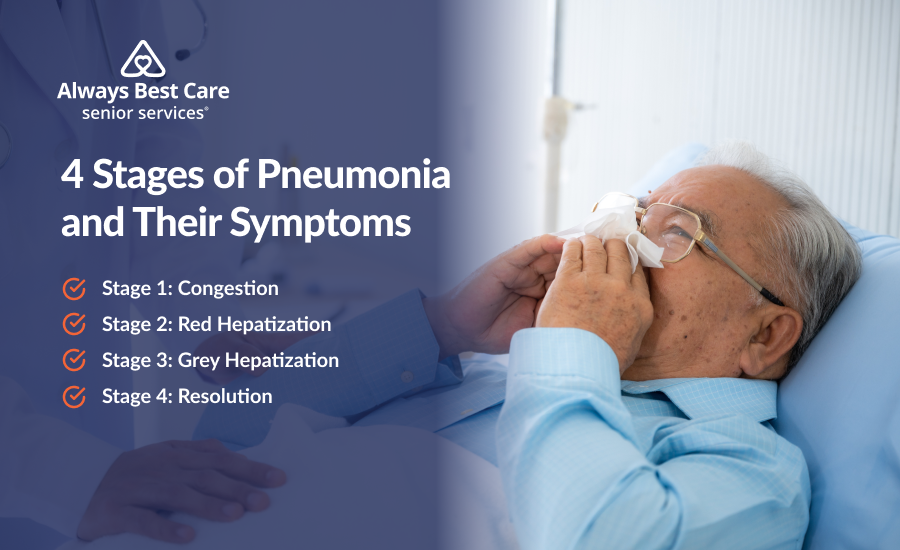
Understanding Walking Pneumonia
Walking pneumonia is a milder form of pneumonia that usually doesn’t require bed rest or a hospital stay.
Unlike more severe cases, the symptoms are usually milder, so most people can continue their daily routines while they recover.
Walking Pneumonia Symptoms: Here’s What To Watch For
Walking pneumonia can show up any time of year, but it’s most common during the fall and winter months.
Walking pneumonia often comes with symptoms, such as:
- Headaches
- Slight chills
- Frequent sneezing
- A persistent cough
- A sore throat, also known as pharyngitis
- Ongoing fatigue or feeling unusually tired
- Chest discomfort or mild pain when breathing or coughing
- A low-grade fever (typically under 101°F or 38°C)
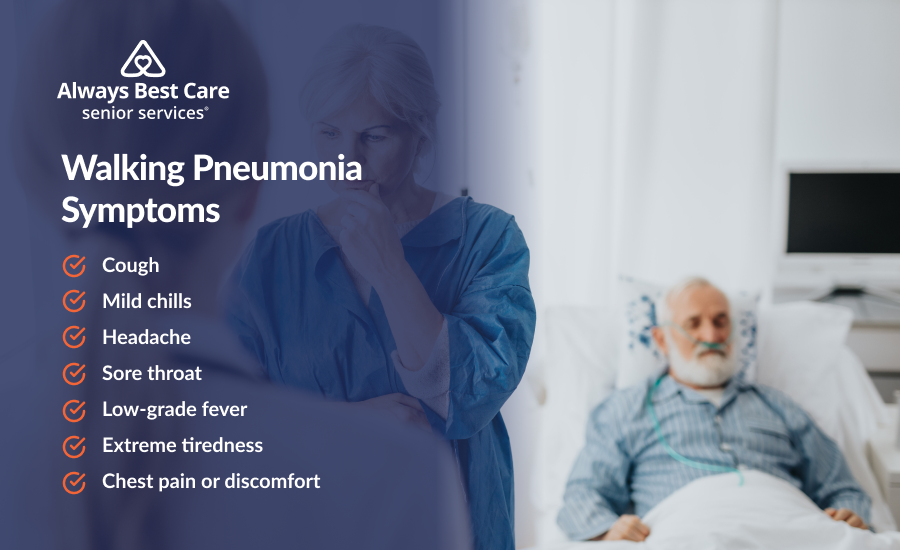
How To Manage Pneumonia Symptoms
Dealing with pneumonia is challenging, but knowing how to manage your loved one’s symptoms can help ease their recovery:
- Use over-the-counter medications wisely: If your loved one has a fever or body aches, medications like ibuprofen, naproxen, or acetaminophen can help bring relief. Just be sure to follow the dosing instructions carefully and check with their doctor before giving anything new, especially if they’re already taking other medications.
- Skip the cough medicine (for now): It might be tempting to ease their cough with over-the-counter meds, but coughing helps clear infection from the lungs. Unless a doctor recommends it, avoid suppressing it.
- Try gentle breathing exercises: Simple, doctor-approved breathing exercises can help open the airways, improve lung function, and even reduce anxiety. If recommended, your loved one might also benefit from using a nebulizer to ease breathing.
- Avoid all types of smoke: Keep your loved one away from cigarette smoke, secondhand smoke, and even wood-burning fireplaces. These can irritate their lungs and slow healing.
- Use a humidifier: A clean humidifier can add moisture to the air, making it easier for your loved one to breathe and helping to soothe irritated lungs. Be sure to clean the device regularly to avoid mold or bacteria buildup.
- Keep them hydrated: Encourage them to sip fluids throughout the day, think water, warm broths, herbal teas, or clear soups are all great choices. Staying hydrated helps thin mucus, making it easier to clear from the lungs.
- Encourage plenty of rest: Recovery takes energy. If possible, help take care of meals, errands, or chores so your loved one can focus on resting. Remind them that taking it slow now will help them bounce back stronger later.
- When in doubt, head to the hospital: If you’re not getting better within a week or your symptoms take a turn for the worse, don’t hesitate to get professional treatment. Sometimes, you may need additional care, such as oxygen therapy or a hospital stay, to get back on track.
How Can Elderly Individuals Prevent Pneumonia?
Pneumonia is preventable and elderly individuals can significantly reduce their risk by taking proactive steps like getting vaccinated.
In fact, the National Foundation for Infectious Diseases (NFID) and the American Lung Association are actively working together to inform older adults that the pneumococcal conjugate vaccine (PCV13) vaccine can help minimize their risk of pneumonia.
In addition to vaccinating your senior loved one, you can also protect them from getting pneumonia by:
- Encouraging them to practice good hygiene: Regularly washing the hands, covering the face when coughing and sneezing, and keeping surfaces clean can make a big difference.
- Boosting their immune system: Ensure they get plenty of sleep, exercise regularly, eat a balanced diet, and drink lots of water.
- Maintaining indoor quality: Keep your living spaces well-ventilated and consider using air purifiers to cut down on allergens, airborne pollutants, and pathogens.
Manage Your Senior Loved One’s Pneumonia Symptoms With Always Best Care
At Always Best Care, we’re dedicated to helping your elderly loved one return to their regular routine during recovery.
When you decide to partner with us, one of our Care Coordinators will meet with you and your loved one to craft a personalized service plan that perfectly suits their needs.
Our caregivers are highly trained professionals who have passed extensive background checks, so you know you’re in good hands.
Our in-home care services can aid in the physical recovery from pneumonia, while supporting the patient’s overall well-being.
These services include, but are not limited to:
- Hospital to Home: This service ensures a seamless transition from hospital back to your home.
- 24-Hour Care & Live-In Care: Continuous monitoring ensures that any changes in the patient’s condition are promptly addressed, providing peace of mind and immediate assistance whenever needed.
- Nutrition Monitoring and Meal Preparation: Eating right is a big part of getting better. We make sure your senior loved one is getting well-balanced meals to boost their immune system and speed up recovery.
FAQs About Pneumonia Stages
What is pneumonia?
Pneumonia is a condition in which air sacs are inflamed in one or both lungs. Fluid or yellow pus fills the inflamed sacs, causing a cough, fever, chills, and difficulty breathing.
Organisms like viruses, fungi, and bacteria can cause this infection.
Infants, adolescents, elderly people over 65, and those with a compromised immune system are more likely to be affected by pneumonia.
What are the potential complications of pneumonia?
Whether your loved one’s pneumonia is caused by bacteria, a virus, or fungus, it could lead to other health issues, such as:
- Sepsis, a serious condition in which the body reacts abnormally to an infection, potentially damaging organs
- Bacteremia, which means bacteria have gotten into your blood
- Respiratory failure
- Lung abscesses, also known as pus-filled areas in the lung
- Lung failure
- Kidney failure
- Heart issues
Do antibiotics work for pneumonia?
Yes, antibiotics are commonly used to treat bacterial pneumonia, but they aren’t effective for every type.
Viral pneumonia might require antiviral medication, while fungal pneumonia is treated with antifungals.
If your loved one has been diagnosed, talk to their doctor about the specific type and the care plan that’s right for them. Every case is different, and the right treatment can make all the difference.
Are the final stages of pneumonia fatal?
Complications such as sepsis, septic shock, and organ failure can make the final stages of pneumonia life-threatening.
How soon after treatment for pneumonia will my elderly loved one start to feel better?
If you’re only experiencing a mild case of pneumonia, you might be able to get back to your normal activities within a week.
However, keep in mind that your senior loved one could still feel tired and have a cough that lingers for up to a month.
Can pneumonia go away on its own?
Yes, pneumonia can clear up on its own if it’s mild. With walking pneumonia, symptoms are often mild enough to allow individuals to maintain their daily routine while recovering.


